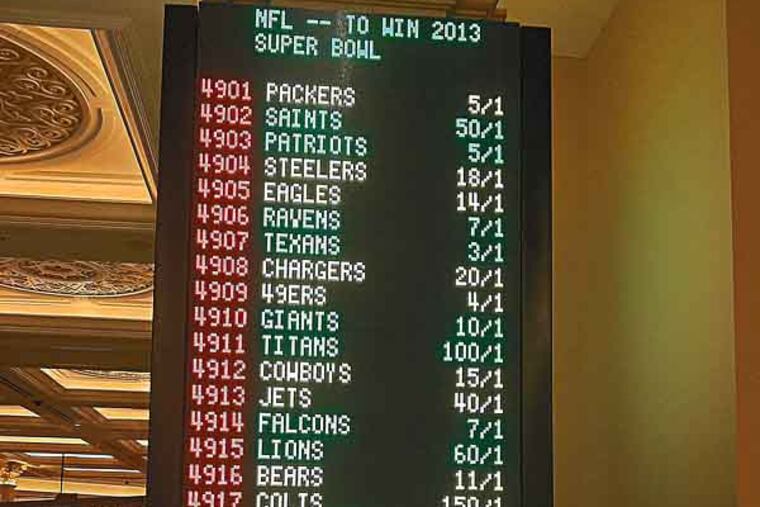New Jersey makes its final appeal for sports betting
In a landmark case being watched closely by other states, New Jersey made a final appeal Wednesday to be able to offer wagering on pro and college sports.

In a landmark case being watched closely by other states, New Jersey made a final appeal Wednesday to be able to offer wagering on pro and college sports.
And lawyers for the four major professional sports leagues and the NCAA reiterated their position why New Jersey should be forbidden to do so.
The two sides appeared in a packed courtroom for a 11/2-hour session before the U.S. Court of Appeals for the Third Circuit in Philadelphia. The three-member panel hearing arguments consisted of Judges Julio Fuentes, D. Michael Fisher, and Thomas Vanaskie.
"The leagues have not, and cannot, prove that controlling sports gambling and regulating it - which is already taking place in New Jersey and throughout the United States illegally under cover of the black market - that regulation of that activity will somehow hurt the leagues," said lawyer Ted Olson, representing New Jersey, Gov. Christie, and the state Division of Gaming Enforcement. "They have not proven that. They cannot prove that."
New Jersey wants to join the four states currently permitted under federal law to offer some form of sports betting.
The NFL, Major League Baseball, the NHL, the NBA, the NCAA, and the Justice Department, represented by lawyers Paul Clement and Paul Fishman, oppose expanding the 1992 Professional and Amateur Sports Protection Act (PASPA), which limits sports betting to Nevada, Oregon, Montana, and Delaware, with Nevada having by far the most freedom.
"New Jersey's sports-wagering law is flatly inconsistent with PASPA," Clement said. "Unlike Delaware . . . New Jersey has no real theory on how its [sports betting] law could be reconciled with PASPA. Accordingly, New Jersey has little choice but make a direct assault on PASPA."
Clement said the federal government's view of PASPA had stayed consistent over 20 years, countering Olson's claim that its interpretation of the federal law had shifted. "Congress decided back in 1992 that state-authorized gambling - not decriminalization of it - was a problem," Clement said.
But by regulating sports gambling, argued Olson, New Jersey would "shine a light on that activity [illegal gambling] and make sure that people that have been convicted of felonies aren't engaging in that activity."
On Feb. 28, a federal judge ruled in favor of the sports organizations and quashed New Jersey's attempt to overturn the PASPA.
In 1993, the state missed a deadline to grandfather in sports betting when a legislative measure failed to make it on the ballot that year.
In 2011, New Jersey voters approved sports betting in a referendum. Christie signed a measure to make it legal last year, but the leagues and the NCAA moved swiftly to block wagering from starting in the Garden State.
"The NCAA maintains that the spread of legalized sports wagering is a threat to the integrity of athletic competition and student-athlete well-being," the NCAA's Emily Potter said Tuesday.
Under the PASPA, Delaware can offer parlay betting, in which bets on three NFL games must be correct to win. Four years ago, the state lost in court its bid to offer single-game wagering, the kind only Nevada now enjoys, and the most lucrative type.
Fisher presided over the 2009 Delaware case, in a decision that favored the leagues in shooting down full sports betting at Delaware's three casinos.
Christie has said he would take the case to the U.S. Supreme Court if New Jersey loses. The Republican governor says the PASPA "is inequitable, violates New Jersey's rights as a state, and is unconstitutional."
Atlantic City's casinos say sports betting could help them fill hotels and restaurants during the slower winter months.
Sports betting is an estimated $380 billion industry annually in the United States, with just a fraction of that legally wagered in Nevada.